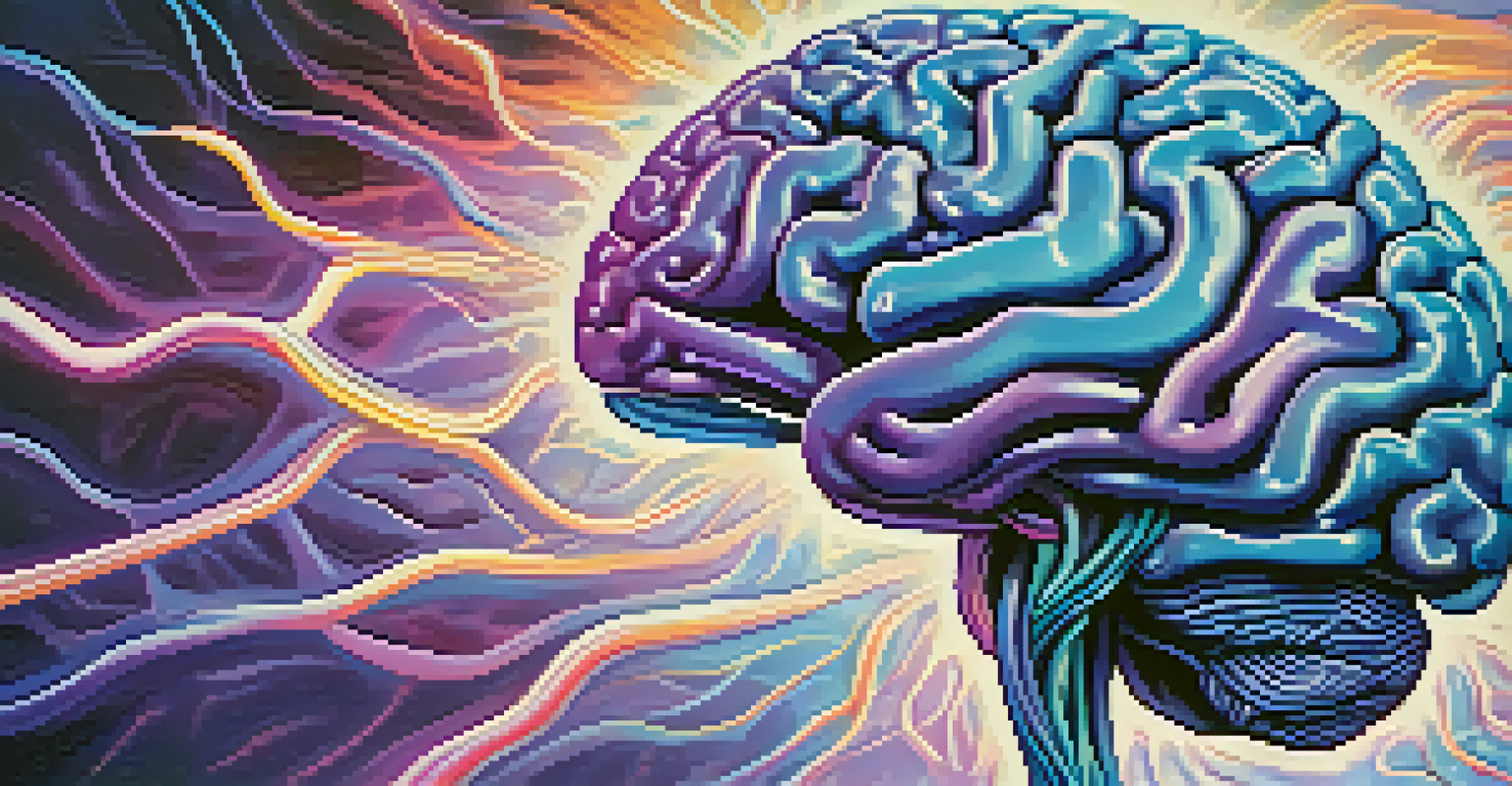The Role of Psychedelics in Fostering Compassionate Behavior

Understanding Psychedelics and Their Effects on the Mind
Psychedelics are substances that alter perception, mood, and various cognitive processes. Common examples include psilocybin, found in magic mushrooms, and LSD. These compounds have been used for centuries in various cultures for spiritual and therapeutic purposes, but their scientific exploration has surged in recent years.
Psychedelics can help us to see the world through the eyes of others, fostering a deeper sense of empathy and connection.
When ingested, psychedelics can create profound experiences that often lead to feelings of interconnectedness and empathy. This shift in perception may allow individuals to see beyond their own perspective, fostering a deeper understanding of others. For many, these experiences can feel like a reset button for the mind, opening doors to new ways of thinking.
Research suggests that psychedelics may enhance neural connectivity, allowing different parts of the brain to communicate more freely. This can lead to heightened emotional awareness and a greater capacity for compassion. As science continues to unlock the mysteries of these substances, their potential for promoting empathy becomes increasingly apparent.
The Science Behind Psychedelics and Empathy
Studies have shown that psychedelics can increase levels of emotional empathy, which is the ability to understand and share the feelings of others. One study involving psilocybin found that participants reported feeling more connected to their peers and more compassionate towards them. This suggests that psychedelics may play an important role in fostering a culture of compassion.

Neuroscientific research indicates that psychedelics can reduce activity in the default mode network (DMN), the brain region associated with self-referential thoughts. When this area quiets down, individuals may experience a decrease in ego-driven thinking, which can often be a barrier to empathy. By temporarily silencing the ego, psychedelics might enable a person to step into someone else’s shoes more easily.
Psychedelics Enhance Empathy
Research shows that psychedelics can increase emotional empathy, allowing individuals to better understand and connect with others.
As these findings accumulate, they point towards a fascinating conclusion: psychedelics could potentially be used as therapeutic tools in settings like counseling or conflict resolution. By promoting compassion and understanding, they may help individuals heal emotional wounds and bridge divides.
Personal Stories: Transformative Experiences with Psychedelics
Many individuals have shared powerful personal stories about how psychedelics have changed their perspectives on life and relationships. For instance, a common theme among users is the profound sense of love and connection experienced during trips, which often translates into real-world compassion. These stories highlight the potential for psychedelics to act as catalysts for personal growth.
The great thing about psychedelics is that they can help you understand the mind and how it works, opening the door to compassion and empathy.
One individual recounted an experience with ayahuasca, a plant-based psychedelic, where they felt an overwhelming sense of love for their family and friends. This experience prompted them to reach out and mend broken relationships, showcasing the potential for psychedelics to inspire acts of kindness and understanding. Such changes often lead to a ripple effect, encouraging a more compassionate environment.
These anecdotes underscore the idea that psychedelics can serve as more than just recreational substances; they can be transformative tools that foster deeper connections with oneself and others. As more people share their experiences, it becomes clear that the potential benefits of psychedelics extend beyond individual use to societal implications.
Cultural Perspectives on Psychedelics and Compassion
Throughout history, various cultures have recognized the role of psychedelics in promoting communal bonding and compassion. Indigenous tribes in the Amazon, for example, have used ayahuasca in rituals to cultivate empathy and heal social rifts. These traditions illustrate that the use of psychedelics for fostering connections is not a new concept; it has deep roots in human history.
In modern times, there is a growing movement advocating for the re-integration of psychedelics into therapeutic and spiritual practices. This movement often emphasizes the importance of compassion and understanding in the healing process. By drawing inspiration from traditional practices, contemporary society can explore how psychedelics can enhance emotional and social well-being.
Cultural Roots of Compassion
Various cultures have historically used psychedelics to promote communal bonding and empathy, highlighting their long-standing significance.
As we navigate the complexities of modern life, the teachings from these cultures remind us of the potential for psychedelics to unite rather than divide. By fostering a sense of community and shared experience, psychedelics may contribute to a more compassionate world.
Challenges and Misconceptions Surrounding Psychedelics
Despite the growing body of research supporting the benefits of psychedelics, many misconceptions persist. One common belief is that psychedelics are purely recreational drugs with no therapeutic value. This notion often overshadows the positive outcomes that can arise from responsible use and guided experiences.
Additionally, the stigma attached to psychedelics can deter individuals from exploring their potential benefits. Many people may fear judgment or legal repercussions, despite increasing legalization in various regions. Overcoming this stigma is crucial for wider acceptance and understanding of how psychedelics can foster compassion.
Education and open dialogue are key to dispelling these myths. As more people become informed about the scientific findings and personal experiences related to psychedelics, we can begin to shift the narrative towards one that recognizes their potential for promoting empathy and connection.
Therapeutic Applications of Psychedelics for Compassion
Therapeutic applications of psychedelics are gaining traction, particularly in the fields of psychology and counseling. Mental health professionals are exploring how these substances can be integrated into treatment plans for conditions like PTSD, anxiety, and depression. The compassionate insights gained during psychedelic experiences may provide breakthroughs in these therapeutic settings.
For instance, guided sessions using psilocybin have shown promise in helping individuals confront and process difficult emotions. This approach not only facilitates healing but also nurtures a greater sense of empathy towards oneself and others. By fostering self-compassion, individuals often find it easier to extend that compassion outward.
Therapeutic Potential of Psychedelics
Psychedelics are being explored as therapeutic tools that can facilitate healing and foster self-compassion in mental health settings.
As research expands, the potential for psychedelics to be used in group therapy settings emerges. This could create a shared space for individuals to connect on deeper levels, enhancing mutual understanding and compassion. The future of mental health care may very well include psychedelics as a key component in fostering a more compassionate approach.
The Future of Psychedelics and Compassionate Behavior
The future of psychedelics in fostering compassionate behavior looks promising, as more studies validate their positive effects on empathy. As societal attitudes shift towards acceptance, we may witness a rise in their therapeutic use, enhancing both individual and collective well-being. This could lead to a more compassionate society, where understanding and empathy are prioritized.
As we continue to explore the potential of psychedelics, it’s essential to approach their use with respect and caution. Ethical considerations must guide their integration into therapeutic practices, ensuring safe and supportive environments for users. By fostering an informed and compassionate discourse, we can maximize the benefits while minimizing risks.

Looking ahead, the conversation around psychedelics is likely to evolve, further bridging the gap between science, spirituality, and compassion. This holistic approach may redefine our understanding of mental health and relationships, paving the way for a more empathetic future.